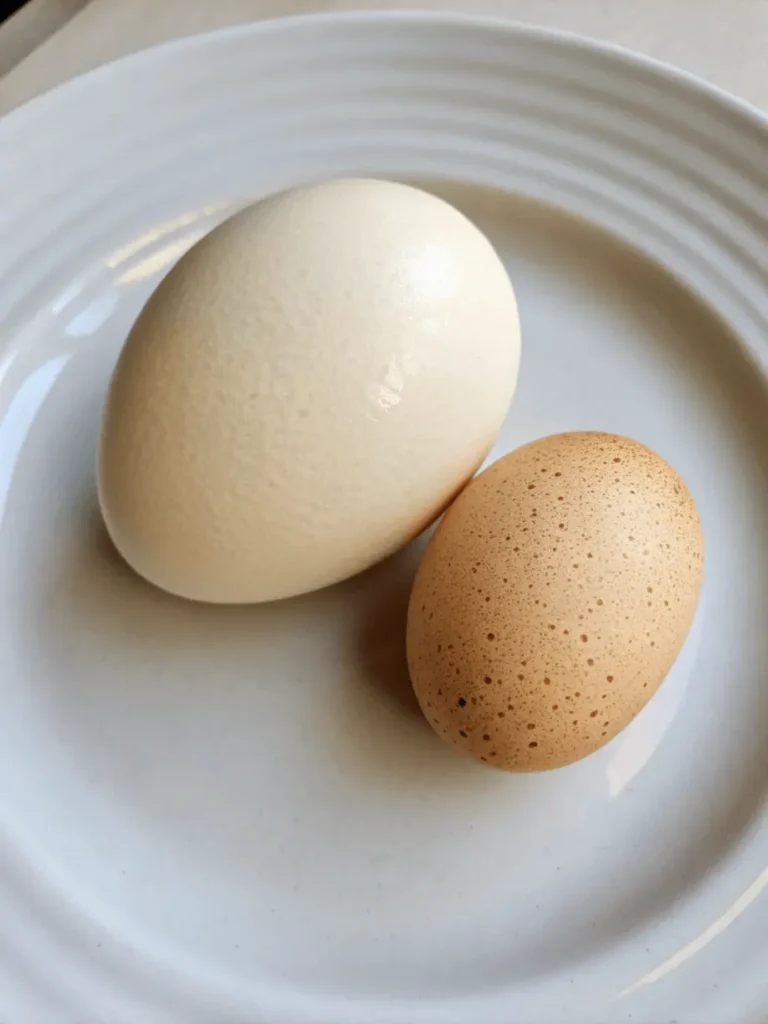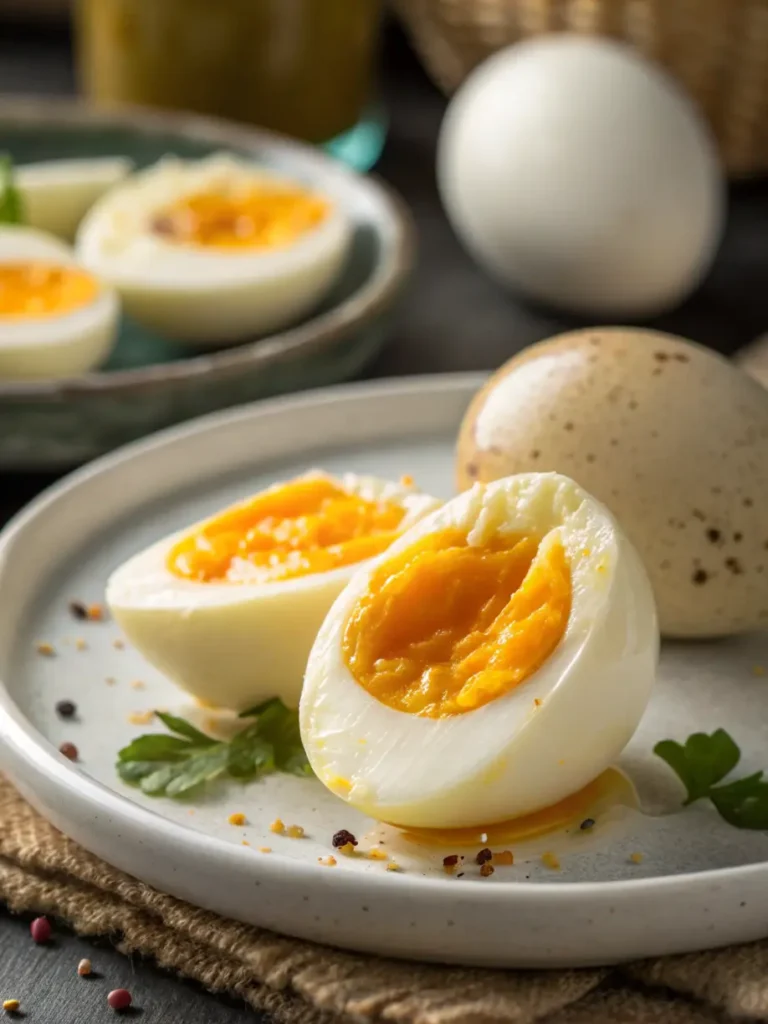Have you ever wondered what turkey eggs taste like? Most people are familiar with chicken and duck eggs, but turkey eggs remain a bit of a hidden gem. They’re bigger, richer, and packed with nutrition, yet you won’t find them in your local grocery store. So, are turkey eggs good to eat? The answer might surprise you! Whether you love trying new foods or just want to switch things up in the kitchen, turkey eggs offer a unique experience. First, let’s explore what makes them so special—because once you learn about their benefits, you might be tempted to hunt some down yourself!
Now, imagine cracking open a turkey egg for the first time. The yolk is golden, the whites are thick, and when cooked, they turn into something deliciously creamy. In addition, they’re incredibly versatile—scramble them, fry them, or even bake with them! If you’re ready to discover a whole new side of eggs, keep reading!
Table of Contents
Turkey Eggs vs. Other Eggs: Key Nutritional Benefits
How Turkey Eggs Compare to Chicken and Duck Eggs

If you’ve ever had a chicken egg, you might wonder how turkey eggs stack up. First, they’re much larger—almost twice the size of a regular chicken egg! This means they have a bigger, richer yolk that gives them a creamier texture when cooked. Duck eggs are also known for their rich flavor, but turkey eggs have a unique balance between mild and buttery.
Next, let’s talk about the shell. Turkey eggs have thicker shells compared to chicken eggs. This means they last longer when stored properly. Duck eggs also have thick shells, but turkey eggs tend to be speckled, making them easy to recognize.
In addition, turkey eggs have a firmer white, which makes them ideal for baking. If you enjoy making custards or fluffy scrambled eggs, you’ll love how turkey eggs add extra creaminess. While they may not be as common as chicken eggs, they’re definitely worth trying if you get the chance!
Here’s a quick comparison to see the differences:
| Feature | Turkey Eggs | Chicken Eggs | Duck Eggs |
|---|---|---|---|
| Size | Larger | Smaller | Medium |
| Yolk Texture | Creamy | Light | Rich |
| Shell | Thick, Speckled | Thin, White | Thick, Smooth |
| Flavor | Buttery | Mild | Bold |
| Best Use | Baking, Scrambling | Everyday Cooking | Baking, Frying |
Turkey eggs also have a firm egg white, which makes them excellent for baking. If you love dishes like egg-fried rice, turkey eggs can enhance the texture and flavor, giving your dish an extra creamy boost!
Unique Vitamins, Protein and Healthy Fats in Turkey Eggs
Turkey eggs pack a serious nutritional punch! First, they have more protein per egg than chicken eggs, making them a great choice for muscle growth and energy. If you’re looking for a filling breakfast that keeps you going, turkey eggs are a fantastic option.
Also, they contain healthy fats that support brain function. Their yolks are rich in omega-3 fatty acids, which help with memory and focus. Compared to chicken eggs, turkey eggs offer a slightly higher fat content, giving them a richer taste and extra nutrients.
In addition, turkey eggs are loaded with essential vitamins. They have more vitamin B12, which helps keep your nerves and blood cells healthy. They also contain vitamin A, which is great for your skin and eyesight.
Here’s a breakdown of the key nutrients in turkey eggs:
| Nutrient | Turkey Eggs | Chicken Eggs | Benefit |
|---|---|---|---|
| Protein | 8g | 6g | Builds muscles and energy |
| Omega-3s | High | Medium | Supports brain health |
| Vitamin B12 | More | Less | Boosts red blood cells |
| Vitamin A | More | Less | Improves vision |
If you want a nutrient-dense egg that keeps you full and energized, turkey eggs are a great choice. They might not be as common, but they definitely bring something special to the table!
For a delicious breakfast, try pairing turkey eggs with creamy Parmesan soup—the richness of the yolks perfectly complements the creamy broth!
Taste, Texture and Best Ways to Cook Turkey Eggs

What to Expect in Flavor and Consistency
If you’ve ever wondered what turkey eggs taste like, get ready for a delightful surprise! First, they have a rich, buttery flavor that’s slightly creamier than chicken eggs but not as strong as duck eggs. The yolk is noticeably larger, making every bite feel more indulgent.
Next, let’s talk about texture. Turkey eggs have a firmer egg white compared to chicken eggs, which gives them a slightly chewy feel when cooked. The yolk, however, stays smooth and creamy, making it perfect for dishes that need a velvety finish.
In addition, the thickness of turkey egg whites makes them excellent for baking. They help create fluffier cakes, richer custards, and creamier sauces. If you love a good omelet, you’ll notice that turkey eggs hold their shape well, making them easier to fold and flip.
Here’s a quick comparison of how turkey eggs feel and taste:
| Feature | Turkey Eggs | Chicken Eggs | Duck Eggs |
|---|---|---|---|
| Flavor | Buttery, Rich | Mild, Light | Bold, Savory |
| Yolk Size | Large, Creamy | Small, Soft | Medium, Thick |
| White Texture | Firm, Chewy | Soft, Runny | Thick, Gel-like |
| Best Use | Baking, Scrambling | Everyday Cooking | Frying, Baking |
If you’re curious about all things turkey eggs, check out this detailed guide on their nutritional value, flavor, and cooking potential.
Cooking Methods to Bring Out the Best Taste
Turkey eggs can be cooked in several ways, and each method highlights their unique qualities. First, they’re amazing when scrambled—the extra yolk makes them creamier and richer. Also, they fry beautifully, creating crispy edges while keeping the yolk velvety inside.
Next, if you love baking, turkey eggs add extra moisture and fluffiness to cakes and pastries. Their rich yolks also make homemade mayonnaise and custards taste incredible.
For a fun way to cook them, try soft-boiling—the thick whites stay firm, while the yolk stays deliciously runny. If you prefer hard-boiled eggs, just cook them a bit longer, and you’ll get a creamy texture inside.
Here are the best cooking methods for turkey eggs:
- Scrambled – Creamy and fluffy, perfect for breakfast.
- Fried – Crispy whites with a soft, runny yolk.
- Boiled – Soft-boiled for a runny yolk or hard-boiled for a firm, creamy center.
- Baked – Great for cakes, muffins, and custards.
- Poached – Smooth and silky, perfect for toast or salads.
To see how turkey eggs compare in different cooking styles, check out the chart below:
| Cooking Method | Result | Best For |
|---|---|---|
| Scrambled | Soft, creamy | Breakfast, quick meals |
| Fried | Crispy edges, rich yolk | Sandwiches, avocado toast |
| Boiled | Soft or firm inside | Salads, meal prep |
| Baked | Adds moisture, rich flavor | Cakes, muffins, quiches |
| Poached | Smooth, delicate | Eggs Benedict, gourmet dishes |
With so many ways to enjoy them, turkey eggs are worth trying in your next meal. Whether you scramble, fry, or bake them, you’re in for a treat!
For the best results, look for ethically sourced farm-fresh ingredients to ensure quality and sustainability.
Where to Find Turkey Eggs and Why They’re Rare
The Limited Supply and Availability in Markets
If you’ve never seen turkey eggs at the grocery store, you’re not alone! Unlike chicken eggs, which are easy to find, turkey eggs are much rarer. The main reason is that turkeys lay far fewer eggs. While a chicken lays one egg per day, a turkey only lays two to three eggs per week. That’s a huge difference!
Next, most turkeys are raised for meat rather than eggs. Farmers focus on producing Thanksgiving turkeys rather than collecting their eggs for sale. Since there’s less demand for turkey eggs, stores don’t stock them regularly.
Also, turkey eggs are more expensive than chicken eggs. Because they are rare and larger in size, they often cost three to four times more than regular eggs. That makes them more of a specialty item rather than an everyday staple.
Here’s a quick comparison of egg production between different birds:
| Bird Type | Eggs Laid Per Year | Availability in Stores | Main Use |
|---|---|---|---|
| Chicken | 250–300 | Very Common | Eggs & Meat |
| Duck | 150–200 | Somewhat Common | Eggs & Meat |
| Turkey | 80–100 | Very Rare | Mostly Meat |
Since turkey eggs aren’t mass-produced, you won’t find them at major supermarkets. However, there are still ways to get your hands on some if you know where to look!
How to Source Fresh Turkey Eggs Locally and Online
Finding turkey eggs takes a little effort, but it’s totally possible! First, check out local farms. Small, family-run farms often sell turkey eggs directly to customers. You can visit them in person or check their websites for availability.
Next, try farmers’ markets. Many vendors offer specialty eggs, including turkey eggs, during the right season. Spring and early summer are the best times to find them since that’s when turkeys lay the most eggs.
If you prefer online shopping, there are several options:
- Local farm websites – Many farms list turkey eggs for sale online.
- Online marketplaces – Specialty food websites sometimes have farm-fresh turkey eggs.
- Social media groups – Join farm-related groups on Facebook or Instagram to find small-scale sellers.
- Egg delivery services – Some specialty food subscription boxes include rare eggs like turkey eggs.
To make your search easier, here’s a breakdown of where to look:
Best Places to Buy Turkey Eggs:
| Source | Availability | Best Time to Buy |
|---|---|---|
| Local Farms | High | Spring & Summer |
| Farmers’ Markets | Medium | Spring & Summer |
| Online Farms | Medium | Year-Round |
| Specialty Websites | Low | Varies |
Turkey Egg Availability by Season:
| Month | Availability | Best Place to Buy |
|---|---|---|
| January–March | Low | Online only |
| April–June | High | Farms & Markets |
| July–September | Medium | Farmers’ Markets |
| October–December | Low | Online only |
Since turkey eggs are rare, you might need to be patient. However, once you find them, you’ll get to enjoy their rich taste and unique texture. It’s worth the hunt!
Safety, Storage and Handling Tips for Turkey Eggs
Best Practices for Cleaning and Storing Turkey Eggs
When you finally get your hands on turkey eggs, you want to keep them fresh for as long as possible. First, cleaning them properly is key. Unlike chicken eggs, turkey eggs often have thicker shells with a natural protective layer. This layer helps keep bacteria out, so washing them too soon can shorten their shelf life.
Next, if your eggs look clean, avoid washing them until right before use. If they have dirt or debris, wipe them gently with a dry cloth or soft brush. If needed, rinse them quickly with warm water and dry them immediately. Never soak them—this can let bacteria sneak through the shell.
Once they’re clean, storing them the right way is important. In addition, turkey eggs last longer in a cool, stable environment. Keeping them in the refrigerator extends their freshness by several weeks. If you store them at room temperature, use them within a week for the best quality.
Here’s a quick guide to proper turkey egg storage:
| Storage Method | Best Temperature | Shelf Life |
|---|---|---|
| Refrigerator | 35–40°F (1–4°C) | 4–6 weeks |
| Room Temp | 50–70°F (10–21°C) | 1 week |
| Freezing (whites only) | 0°F (-18°C) | 1 year |
For long-term storage, consider freezing. Crack the eggs, separate the yolks from the whites, and freeze them in an airtight container. That way, you can enjoy turkey eggs even when they’re out of season!
Shelf Life, Spoilage Signs, and How to Keep Them Fresh
Turkey eggs can stay fresh for weeks if stored properly, but how do you know when they’ve gone bad? First, do the float test. Fill a bowl with water and place the egg inside.
- Fresh eggs will sink and lay flat.
- Slightly older eggs will stand upright.
- Spoiled eggs will float—don’t eat them!
Next, check the shell. If it has cracks, a slimy texture, or a bad smell, toss it out. Even if the egg looks fine, a strong sulfur-like odor when cracked is a clear sign that it’s no longer good.
To keep your turkey eggs fresh longer, follow these simple tips:
- Store them in their carton – This prevents moisture loss and keeps odors out.
- Keep them in the coldest part of the fridge – The back of the fridge is best, away from the door.
- Avoid sudden temperature changes – Moving them between cold and warm places can cause condensation, which speeds up spoilage.
Turkey Egg Freshness Chart
| Storage Duration | Expected Freshness | Best Use |
|---|---|---|
| 1–2 weeks | Very fresh | Scrambled, fried, boiled |
| 3–4 weeks | Still good | Baking, omelets |
| 5–6 weeks | Less fresh | Hard-boiled, baking |
| 7+ weeks | Risky to eat | Discard if unsure |
By following these tips, you’ll always have fresh turkey eggs ready to enjoy. Whether you’re cooking breakfast or baking something delicious, keeping your eggs fresh makes all the difference!
Ethical, Environmental, and Farming Considerations
Impact of Consuming Turkey Eggs on Poultry Farming
Turkey eggs might not be as popular as chicken eggs, but they play an interesting role in poultry farming. First, turkeys lay far fewer eggs than chickens. While a chicken can produce around 300 eggs per year, a turkey only lays 80–100 eggs annually. Because of this, most farms prioritize raising turkeys for meat rather than eggs.
Next, turkey farming requires more space and resources. Turkeys are larger birds, so they need more land to roam and more food to grow. Raising them just for eggs wouldn’t be as profitable as raising chickens, which is why most farms don’t focus on selling turkey eggs.
In addition, turkey eggs could be a great alternative for small-scale farms. Since they have thicker shells and longer shelf life, they might help reduce food waste. Encouraging more farmers to sell turkey eggs could provide an additional income source and promote sustainable poultry farming.
Here’s a quick look at how turkey farming compares to chicken farming:
| Factor | Turkey Farming | Chicken Farming |
|---|---|---|
| Eggs per Year | 80–100 | 250–300 |
| Space Needed | Large Areas | Small Coops |
| Main Product | Meat | Eggs & Meat |
| Egg Availability | Rare | Common |
Sustainable and Ethical Ways to Enjoy Turkey Eggs
If you love the idea of trying turkey eggs, you might wonder how to enjoy them without harming the environment. First, look for local and pasture-raised options. Many small farms raise turkeys in free-range settings, where they have plenty of space to roam.
Next, consider supporting ethical farmers. Some farmers sell turkey eggs without compromising the sustainability of their flock. You can check for certifications like “pasture-raised” or “humane farming practices” to ensure the birds are treated well.
To make sure you’re choosing the most ethical option, follow these tips:
- Buy from local farms – This supports small businesses and reduces transportation emissions.
- Choose pasture-raised eggs – Turkeys raised in open spaces live healthier lives.
- Ask about farming practices – Look for farms that prioritize ethical treatment.
- Limit waste – Use every part of the egg, from baking to making sauces.
Comparison of Egg Sourcing Options:
| Sourcing Method | Ethical Rating | Environmental Impact | Best Choice For |
|---|---|---|---|
| Factory Farms | Low | High Pollution | Cheap Eggs |
| Free-Range Farms | High | Low Impact | Sustainable Eating |
| Backyard Farming | Very High | Minimal Impact | Self-Sufficient Households |
Environmental Impact of Egg Production:
| Factor | Chicken Eggs | Turkey Eggs |
|---|---|---|
| Land Use | Low | High |
| Water Needs | Low | Medium |
| Carbon Footprint | Moderate | Higher |
| Waste Production | Lower | Higher |
By making conscious choices, you can enjoy turkey eggs while supporting ethical farming. Whether you buy from a small farm or raise your own turkeys, choosing sustainable sources makes a difference. Plus, knowing your food comes from a good place always makes it taste better!
Frequently Asked Questions (FAQs)
Why don’t we commonly eat turkey eggs?
Turkey eggs are rare because turkeys lay fewer eggs than chickens. A chicken lays one egg daily, while a turkey only lays two or three per week. Also, most farms focus on raising turkeys for meat, not eggs. Since they are harder to find, turkey eggs don’t make it to grocery stores. But if you find some, they’re definitely worth trying!
Are turkey eggs healthier than chicken eggs?
Yes! Turkey eggs have more protein, vitamins, and healthy fats than chicken eggs. Their large yolks are packed with omega-3s, which help brain function. They also contain more vitamin B12, which supports energy levels. In addition, their thick shells help preserve nutrients longer. If you want a nutrient-dense egg with a rich taste, turkey eggs are a fantastic choice. They’re delicious and nutritious!
Why are turkey eggs not sold in stores?
Turkey eggs are not sold in stores because turkeys lay fewer eggs than chickens. Since they don’t produce eggs regularly, farms prefer raising them for meat. Also, turkey eggs cost more to produce, making them too expensive for regular grocery sales. Instead, you can find them at small farms, specialty markets, or online. If you spot some, grab them—they’re a rare treat!
How long are turkey eggs good for?
Turkey eggs last longer than chicken eggs because of their thick shells. If refrigerated, they stay fresh for four to six weeks. At room temperature, they should be used within a week. To check freshness, try the float test—fresh eggs sink, while bad ones float. If you store them properly, turkey eggs will stay good for a long time and remain delicious!
Conclusion: Unlocking the Potential of Turkey Eggs in Your Kitchen
Turkey eggs are a hidden gem in the world of cooking. They are rich, creamy, and packed with nutrients. If you’ve ever wondered, “Are turkey eggs good to eat?”—the answer is yes! Their large yolks make dishes extra flavorful, and they work great in everything from scrambled eggs to baked treats.
Finding turkey eggs may take some effort, but they’re worth it. First, check local farms and specialty markets. Then, experiment with different cooking methods to bring out their unique taste. In addition, their thick shells help them stay fresh longer, making them a great choice for home cooking.
So why not give them a try? If you find some, grab a few and enjoy the rich, buttery flavor. Cooking with turkey eggs is a fun adventure. You’ll love the delicious results, and your kitchen will never be the same!

